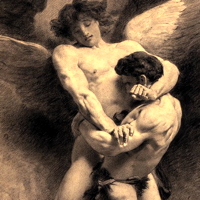One way to dismiss the story and all that it says about how to get god to behave is to concede that Isaac’s son Jacob is a lying sack o’ isht. He is, of course. The wrongs—plural—he does his brother Esau hardly commend Jacob as a model of prophetic rectitude. But if we simply admit that Jacob’s a bad guy, we open a giant, yawning hole in scripture that will never close.
I don’t mind calling Jacob a rat, and I don’t mind opening that hole in scripture. What I’m going to point out, here, is meant for the folks of Biblical traditions who are certain that scripture is whole and sound, and that Jacob and all he does are prophetically irreproachable.
Over in Genesis 32, Jacob’s on his way back home after twenty years of hard labor and producing children, and scared spitless that his older brother Esau is going to crack his skull open. On the border, at night, Jacob meets a mysterious stranger, whom he grabs and wrestles to the ground. They wrestle a long time, Jacob and the stranger. Most of the night. The stranger tries, desperately, to get away, but Jacob will not let him go, even after Jacob’s hip dislocates in the tussle. You’re not going anywhere, Jacob shouts, holding tightly to the recalcitrant figure, until you give in. As the sun comes up, the stranger relents, blesses Jacob, and Jacob dubs the spot of ground Peniel, because, says Jacob, I’ve seen god face to face and prevailed.
Good ol’ lying, thieving Jacob. The prophet who grabbed god and would not let go until god cried, “Uncle!” We might learn a lot from Jacob.
The popular let go, and let god dogma strikes me as ignorant—perhaps willfully so—of Jacob the prophet’s confrontation of divinity. If the Bible isn’t God’s Infallible Word, then never mind what Jacob does at Peniel. But if we’re bound by the Bible, then we have to face up to the fact that—besides teaching us to defraud our siblings—Jacob teaches us not to wait for god to make things right.
Of course, that was so Old Testament. But Jesus himself acknowledges Jacob’s prophetic legitimacy alongside his father and grandfather, and also expresses a similar opinion on the subject of waiting for god to change things. In Luke 18 we find Jesus extolling the virtues of a woman who simply did not give up, and so pestered authority to give her justice that authority eventually had to give in.
Don’t let god off so easily, Jesus tells his crowd. You’re bound to change god’s mind, eventually, if you just don’t let go.
One of the principal arguments against changing the way in which institutionalized religious tradition operates is that we can’t simply change things to suit the latest fancies. God has set things up the way they are, goes the rationale, and only god can change them. So we affirm and reassert inequities and abuses that we know very well are wrong—and that we do not tolerate outside religious contexts—under the excuse that we have to let god take god’s course. But effort, fierce effort, to change god’s mind is valorized in Genesis and praised by Jesus. It may be, actually, that we—regular folks and those ordained to lead—are just not wrestling hard enough, when god’s will seems onerous or obscure.
Anyway, what is Jesus’s parable of the talents if not the argument that god’s not going to tell us everything to do—or, even anything to do—but that god has set us free to make things better, in whatever way we can figure? Just do some good in the world and report back, okay?, says god in Jesus’s story. If you only sit on your a$$ waiting for me to tell you what to do, you can go to hell.
Don’t get mad at me for the harshness: it’s Jesus who says that the useless, fearful servant gets to go to outer darkness, with wailing and gnashing of teeth, and all of that. It may be that by doing nothing for fear of doing something of which god would not approve, we’ve done exactly that.
In LDS-Mormonism, the waiting dogma has appeared in recent discourse as none of us—none of the regular folks and none of those ordained to lead—is free to alter divinely decreed patterns, concerning, for instance, who can be ordained and who can marry whom. The notion seems to be that we have acknowledged that something is amiss in the church, but that we all have to wait on god’s prerogative, which will be revealed through some mechanism about which we know very little.
The waiting dogma expressed here feels very un-Mormon to me. We find, after all, the oft-wrestling, nineteenth-century founder of Mormonism enjoining folks: Weary god until he blesses you. And the best of Mormon scripture gives us god’s own voice: For behold, it is not meet that I should command in all things; for he that is compelled in all things, the same is a slothful and not a wise servant; wherefore he receiveth no reward.
Well, we LDS-Mormons could just be slothful, I guess, and unwise, and hope for the best. Or maybe we should stop using god hasn’t said as an excuse to resist living more humanely. Maybe we should grab hold of god, say how we’re going to do things now, and implement change. If god can escape, shame on us.
And if Peniel and persistent widows and the wasting of talents are just stories that we don’t have to take seriously, then, in spite of the rhetoric, we are at liberty simply to reject prophetic words and actions that bother us, after all.
And that’s what Jacob would call a win-win.












